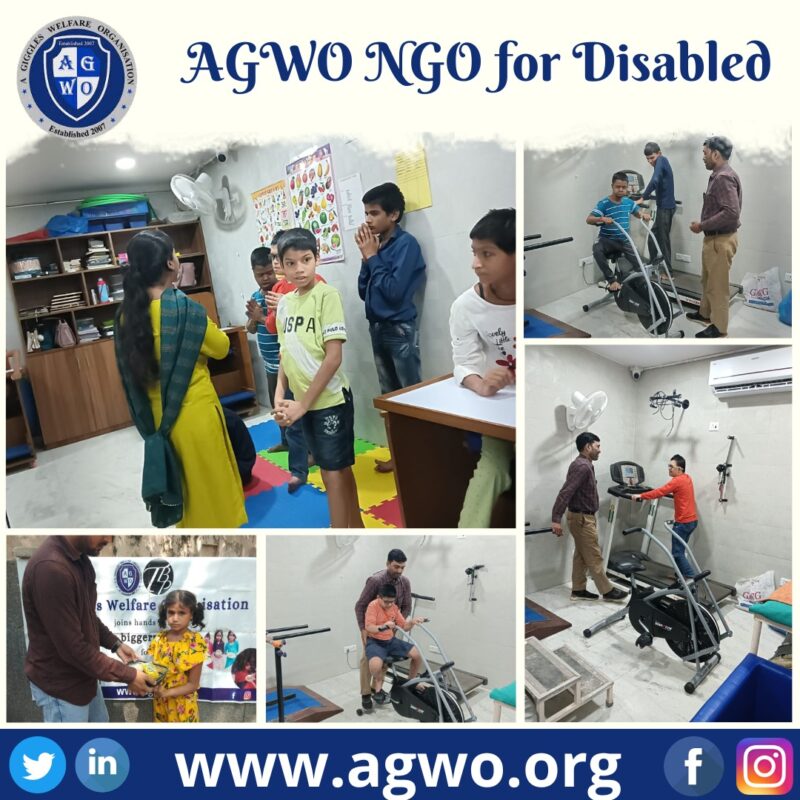Individuals with disabilities often struggle with feelings of hopelessness, shame, and invisibility as they hide their conditions from the world due to fear of ridicule and judgment. This can lead to a loss of confidence and self-expression, making it difficult for them to participate fully in daily life. AGWO NGO for Disabled, aims to empower individuals with disabilities by boosting their confidence, promoting equality, creating a society where everyone can thrive.
NGO for Disabled: Disability can’t decide the future
Today, the world population is over 8 billion people, and more than one billion people, or approximately 15 percent of the world’s population, live with some form of disability. Eighty percent of them live in developing countries. This data gives us an understanding of how prevalent disabilities are worldwide. It’s important to recognize that people with disabilities lead fulfilling lives without any shame. They have accepted their conditions and work to improve them every single day. As an NGO for Disabled, we aim for individuals to live life to the fullest without any regrets. A disability should not determine one’s future.
We believe that people with disabilities should focus on developing other skills to overcome the challenges they face. With advancing technology, there are many alternatives for people with disabilities, but our organization focuses on supporting those who cannot afford such facilities and live below the poverty line. We are dedicated to uplifting these individuals and making society more suitable for them. We should not feel bad about the way we are made; instead, we should feel blessed. Everyone is unique and has different abilities, and that’s what we promote at the heart of our work with individuals with disabilities in our nation.
Types of disabilities
- Physical disabilities include conditions that affect mobility, such as wheelchair users or amputees, as well as chronic pain or illnesses like arthritis or fibromyalgia.
- Sensory disabilities include deafness or hearing loss, blindness or visual impairment, and tactile defensiveness or sensory processing disorder.
- Intellectual disabilities include conditions that affect cognitive function, such as intellectual developmental disorder (IDD), Down syndrome, and autism spectrum disorder (ASD).
- Neurological disabilities include conditions that affect the brain and nervous system, such as stroke or traumatic brain injury, epilepsy, and multiple sclerosis.
- Mental health disabilities include conditions that affect emotional and mental well-being, such as depression, anxiety disorders, and bipolar disorder.
- Developmental disabilities include conditions that affect development and growth, such as cerebral palsy, spina bifida, and muscular dystrophy.
- Learning disabilities include conditions that affect learning and cognition, such as dyslexia, dyscalculia, and dysgraphia.
- Hidden disabilities include conditions that are not immediately visible. Such as chronic fatigue syndrome, fibromyalgia, and chronic illnesses like diabetes or lupus.
Challenges for disabled individuals
Living with a disability can be very challenging due to numerous barriers. These include physical environment and transportation accessibility issues. As well as social stigma and stereotypes leading to isolation and low self-esteem. Moreover, there is often a lack of accessible information about available services and programs. Along with discrimination and exclusion from social events and decision-making processes.
Financial struggles, such as reduced income and limited access to financial assistance programs, can also be a significant burden. Additionally, coping with physical symptoms, managing mental health, and dealing with the emotional impact of disability can be overwhelming. Individuals with disabilities may have difficulty accessing education and employment opportunities, navigating support systems, and finding personal assistance. All of which can impact their overall well-being and quality of life.
Boosting spirit: Cure of disability
Our NGO for Disabled believes that the best way to address disability is to connect with the person spiritually and mentally. Understand their situation, address their fears and challenges, and find suitable alternative solutions. We strive to boost their confidence by providing proper medical assessments, nutritious meals, and counseling at our rehab center. Where we treat hundreds and thousands of disabled individuals, including children.
Our goal is to understand their situation and suffering.Our professional counselors work to calm the chaos in the minds of children and adults with disabilities. Additionally, we provide education to enhance the overall character of children with disabilities and engage in various physical activities to ensure they maintain good health. Lastly, we aim to create a more home-like environment for these individuals with our caring and supportive approach.
Conclusion
Our AGWO NGO for Disabled believes in healing people with disabilities from the inside out. Rather than just focusing on the outside. We are dedicated to being life-savers, working towards a better and brighter future for individuals and children with disabilities. This is achieved by providing nutritious meals, medical assistance, and counseling to improve their mental well-being. We aim to help those who have lost hope regain their sense of identity and hope. So they can move forward in life and achieve great things.
You can visit our website to learn more about our work and get answers to any questions you may have about support. To learn more about us, visit https://www.agwo.org. Join the conversation with us on social media. You can follow us on Facebook, Twitter, LinkedIn, and Instagram for regular updates. We anticipate that this blog will alter how you read AGWO reviews.

